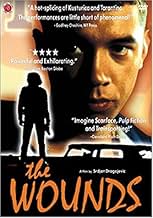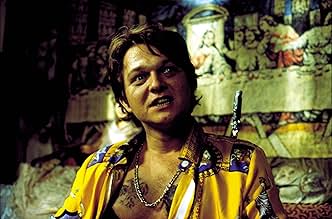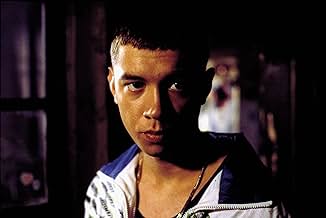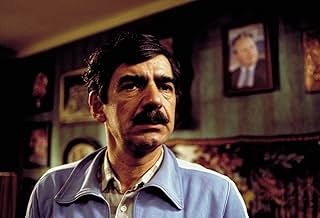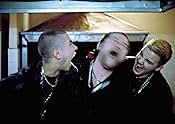This film follows two Belgrade youths on their rise to gangster legends in a decaying society.This film follows two Belgrade youths on their rise to gangster legends in a decaying society.This film follows two Belgrade youths on their rise to gangster legends in a decaying society.
- Awards
- 4 wins total
Predrag 'Miki' Manojlovic
- Stojan
- (as Miki Manojlovic)
Zorka Manojlovic
- Svabina baka
- (as Zora Manojlovic)
Radoslav 'Rale' Milenkovic
- Inspektor
- (as Rale Milenkovic)
Nikola Pejakovic
- Kafedzija
- (as Nidzo Pejakovic)
- Director
- Writer
- All cast & crew
- Production, box office & more at IMDbPro
Featured reviews
Srdjan Dragojevic dedicates his film 'The Wounds' to "post-Tito generations," and it can be seen as of a piece with his previous film 'Pretty Village, Pretty Flame,' an allegory concerning the Bosnian conflict that was one of the angriest, most jarring anti-war films I've seen. 'The Wounds' is an even more aggressive film, told in non-linear fashion, like 'Pretty Village,' beginning in 1996, coiling five years back in time, and progressing to its starting point, so that the events that follow from thereon have an even greater immediacy. The storyteller is a young man named Pinki, born on the day of Marshal Tito's death, named such because his father was arrested after naming him "Tito" -- in honor of the fallen leader, but interpreted by authorities as an insult.
Pinki and his pal Kraut idolize a gangster known as Dickie, who lives in the same housing project. Dickie, an impulsive sociopath who carries a gun at all times and fires it into his television set at random, takes them under his wing and grooms them to become violent criminals. The film, by this point, may begin to remind a viewer of 'GoodFellas,' or the more current 'City of God,' from Brazil. But while those films were stylistically bold, this film is stylistically outrageous. Srdjan Dragojevic slings acid in the face of the viewer, forever surprising his audience with uncompromising nastiness. One does not grow inured to the shocks, however, because the shocks have poetry and relevance, and the movie is tremendously entertaining. This is very exciting filmmaking, the likes of which dwarfs recent work from American filmmakers like Scorsese and Tarantino. Furthermore, it's probably better than anything else from the arguably competitive recent spate of films from the former Yugoslavia, all of which yield a collective cry of anger in the face of the Bosnian civil war, the social conditions of that region, and the region's recent history.
Like other Yugoslav films, 'The Wounds' employs a burlesque tone in its depiction of sexuality, violence, social revolt, and family strife, and yet it does so with such conviction that the movie becomes hypnotic. It would be satire, except its anger is so palpable. It would be allegory, except its writing is so vivid. Whatever it is, it's not easily forgotten.
Pinki and his pal Kraut idolize a gangster known as Dickie, who lives in the same housing project. Dickie, an impulsive sociopath who carries a gun at all times and fires it into his television set at random, takes them under his wing and grooms them to become violent criminals. The film, by this point, may begin to remind a viewer of 'GoodFellas,' or the more current 'City of God,' from Brazil. But while those films were stylistically bold, this film is stylistically outrageous. Srdjan Dragojevic slings acid in the face of the viewer, forever surprising his audience with uncompromising nastiness. One does not grow inured to the shocks, however, because the shocks have poetry and relevance, and the movie is tremendously entertaining. This is very exciting filmmaking, the likes of which dwarfs recent work from American filmmakers like Scorsese and Tarantino. Furthermore, it's probably better than anything else from the arguably competitive recent spate of films from the former Yugoslavia, all of which yield a collective cry of anger in the face of the Bosnian civil war, the social conditions of that region, and the region's recent history.
Like other Yugoslav films, 'The Wounds' employs a burlesque tone in its depiction of sexuality, violence, social revolt, and family strife, and yet it does so with such conviction that the movie becomes hypnotic. It would be satire, except its anger is so palpable. It would be allegory, except its writing is so vivid. Whatever it is, it's not easily forgotten.
This film was my first exposure to life in Serbia to life on a battlefield after society and its rules have deteriorated to dust. Right and wrong yield to anarchy and savagery. It reminded me of William Golding's Lord of the Flies. At the end of the day, under the right circumstances, base human behaviors creep out. Morality comes from our environment. When civilization standards fall, values are lost. Citizens will degrade their fellow citizens to improve their own security, doing whatever they have to do. In Wounds, the surviving behavior emerges in the celebrated lifestyle of a gangster.
Pinki's narration is straight from the gut. He's 20 something at the end, and thinks of himself as an old man. The way he and kraut do the things they do, you just know they could get away with it.
It's a well told, thoroughly enjoyable Tour d'anarchy. Gruesome but real. 8.5 / 10.0
Pinki's narration is straight from the gut. He's 20 something at the end, and thinks of himself as an old man. The way he and kraut do the things they do, you just know they could get away with it.
It's a well told, thoroughly enjoyable Tour d'anarchy. Gruesome but real. 8.5 / 10.0
It's a shame there is no U.S. distribution yet. I got a chance to see this film at the SF film fest and it was brilliant. It definitely has some elements of Scarface along with a coming of age story of a boy in a war torn country. This film Rules!
This movie leaves bitter taste in my mouth and soul, like nothing else I've ever seen. This is the story of one whole generation, a kids just few years younger then me (1972), who have grown up in time and place where most of values ware lost. This is a story of one entire nation (my people) falling down to the very bottom and staying there until they lost all their hopes. This is the story about the little people behind the war and politics, as never spoken so far, since it never happened to You. And finally, this is the story about the fifteen year old boys who's biggest chance in the life was to become a criminals... and they took that chance, never regarding for it.
It's the disturbing reality of 2 working class youths in Belgrade: a life of crime. What makes this movie brilliant is that it does not romanticise our young criminals. Around the world, desperate youths turn to crime for survival and status elevation. We have it in South Africa. City of God tried to show it as it is in Brazil, but Rane has managed to capture the heart of it all. Humour and sincerity are at the heart of this film's success. It's powerful.
And the television show in the movie, where they interview criminals as heroes is not fantasy. This TV show was broadcast in reality. It's a weird world, but it is our world. Each moment of this film, you wonder if you should close your eyes, you anticipate something bad. Yet, I was totally inspired afterwards.
And the television show in the movie, where they interview criminals as heroes is not fantasy. This TV show was broadcast in reality. It's a weird world, but it is our world. Each moment of this film, you wonder if you should close your eyes, you anticipate something bad. Yet, I was totally inspired afterwards.
Did you know
- TriviaThe screenplay is inspired by true events experienced by Besa and Marko, two school fellows of Ivan Ivanovic, a famous serbian Tv comedian who hosts the renowned Talk Show "The night with Ivan Ivanovic".
- ConnectionsReferenced in We Are Not Angels 2 (2005)
- How long is The Wounds?Powered by Alexa
Details
Contribute to this page
Suggest an edit or add missing content


